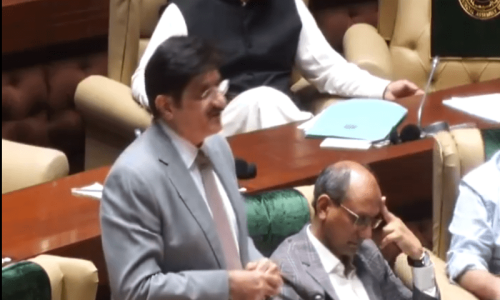KARACHI, June 29: Speakers at a function on Sunday said that Amar Jaleel, through his writings, highlighted real issues being faced by the masses and presented their solutions in a lighter way.
They were speaking at a function organised jointly by Karachi University, the Pakistan Academy of Letters and the Sindh Culture Department to pay tribute to renowned Sindhi literary figure Amar Jaleel, who also writes in Urdu and English, on completion of his 50 years of writing – in fact he has completed 52 years.
Karachi University vice-chancellor Dr Pirzada Qasim Raza Siddiqui said that though a lot of quality literature was being written, there was a scarcity of true critics. He said the university was doing a lot for Sindhi literature, language and culture by planning and organizing various programmes.
Sindh University vice-chancellor Mazharul Haq Siddiuqi said that one of the major reasons that Amar Jaleel was writing the truth was that he had never sought favours from rulers.
Iftikhar Arif of the Pakistan Academy of Letters said that a lot of resistance literature had been written in the country and its major part was in Sindhi in which Amar Jaleel’s share was remarkable.
He said Amar would be remembered for his high place in literature, particularly for his short stories.
Sindh Culture Minister Sassui Palijo said that Amar’s writings were full of deep thought and touched the real issues being faced by the poor and he in his simple way tried to suggest solutions and ways through which the grievances of the masses could be redressed.
She said Amar Jaleel had written short stories, plays for radio and television, novels, and columns in Sindh, Urdu and English. Though his writings were good, his short stories were unmatched.
Earlier, speaking in an emotionally chocked voice and with tearful eyes, Amar Jaleel said that he was overwhelmed by the love shown by the speakers. He said he had been writing honestly on the sufferings of the public and what he felt was right without thinking who might be offended by his writings.
He deplored that after 60 years of independence intolerance in society had increased manifold and people were less tolerant of what others said or believed in. He said he felt that there should be freedom of expression. He termed the long-spells of dictatorships as major causes of intolerance and hoped that with more time under democracy people would learn to coexist peacefully.
Mehtab A Rashdi, Hameed Akhund, Qamar Shahbaz, Dr Sulaiman Shaikh, Lachhman Bhattia and Gobind Khushalani (both from India), Zarar Pirzado, Prof Nagpal, Asif Farrukhi and others also spoke.













































Dear visitor, the comments section is undergoing an overhaul and will return soon.